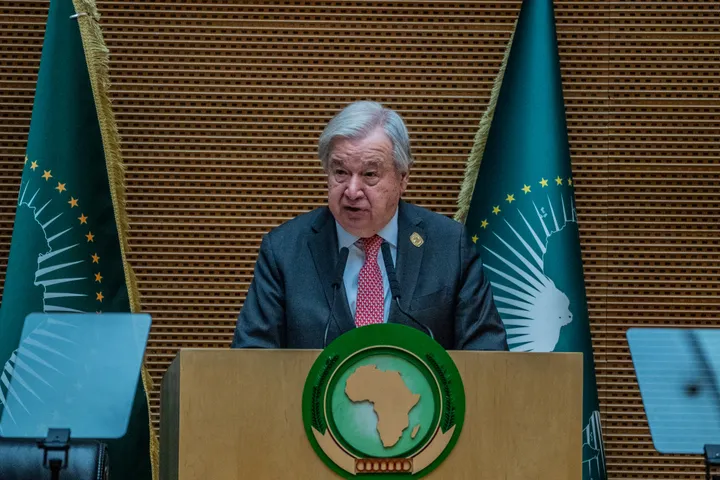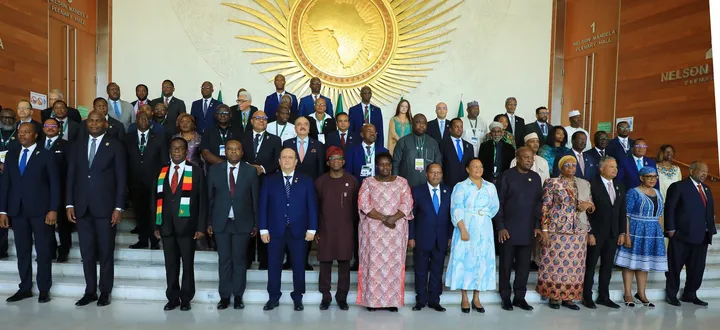By Brian Okoth
For Kenya's former Prime Minister Raila Odinga, his defeat to Djibouti's candidate for the African Union Commission chairmanship accords him the opportunity to return home, where, he says, "a lot of work" awaits him.
Shortly after the AU Commission chairmanship election results were announced on Saturday, February 15, Odinga addressed journalists in Ethiopia's capital Addis Ababa, the headquarters of the African Union.
On his side, were, among others, Kenya's Foreign Affairs Minister Musalia Mudavadi and Environment Minister Aden Duale, both of whom Odinga has worked with, and also differed with politically, at some point in life.
In Kenya's last general election — August 9, 2022 — both Mudavadi and Duale were on the side of President William Ruto's camp, and often threw barbs at Odinga's political camp.
Has seen it all
But on Saturday, the duo stood solidly with Odinga after his painful loss to Djibouti's Foreign Affairs Minister Mahamoud Ali Youssouf.
Expressions of disappointment were visible on their faces, but they had to put up a brave showing — for their candidate and country.
But for Odinga, though remotely someone could notice his disappointment, his choice of words, physical expression, relaxed demeanour, and even occasional smiles portrayed a politician who has seen it all.
Youssouf got the minimum two-thirds vote threshold — 33 votes — to win the AU Commission chairmanship in the seventh round after six rounds of no clear winner. He succeeds Chad's former Prime Minister Moussa Faki Mahamat, who has retired as AUC chief after exhausting his two four-year terms.
Concedes defeat
In his address thereafter, Odinga conceded defeat to Youssouf and wished him well.
The political veteran now heads back home to a ground so familiar to him, and on which he has efficiently flexed his political muscle for more than four decades.
At home, Odinga is a movement. Presidents have struggled to comfortably rule without his backing. And when he is on the opposing side, none of Kenya's last four presidents — Daniel arap Moi, Mwai Kibaki, Uhuru Kenyatta and now William Ruto — had it easy.
Odinga's major political asset is his large support base, which has consistently backed him over the years, and it only grows in number.
Major conductor of Kenya's political orchestra
More often, leaders and politicians in Kenya have been on the record saying that the former prime minister has de facto control over nearly half of Kenya's political landscape.
And now, it is that strong support system Odinga is going back to.
His supporters, however, say that at 80 years old, Odinga may not have the gusto to galvanise crowds, like he did for many years previously.
But his influence may not be wished away just yet, as he remains a major conductor of Kenya's political orchestra.
So close to power
And here is the story of a man who has come so close to power, on several occasions, only losing out almost at the last minute.
In his four decades in active politics, Odinga has spent most of it in the opposition.
Despite that, he always finds a way of accessing government, and pulling strings without an official state title.
After seamless "entry" to government, cabinet ministers and other senior state officials often seek his advice and even update him about the status of government projects.
Son of Kenya's first vice president
But how did Odinga become so integral in Kenya's politics?
The politician is the son of Kenya's first Vice-President Jaramogi Oginga Odinga.
The elder Odinga was Mzee Jomo Kenyatta's vice after Kenya gained independence from Britain in 1963.
Oginga Odinga and Jomo fell out, leading to Odinga's resignation as vice president in 1966 and a subsequent toss to the opposition.
Entry to politics
At the time, Raila Odinga was pursuing his college education in Germany.
Odinga says on his official website that he is a holder of a degree in mechanical engineering.
According to University of Nairobi records, Odinga was part of the institution's academic staff in the 1970s.
He, thereafter, ventured into politics.
First presidential attempt
In 1982, Odinga was detained for six years without trial over allegations that he took part in the failed coup against President Daniel arap Moi.
After his initial release, he was taken into custody twice before fleeing to Norway in 1991.
In the run-up to the 1992 Kenyan elections, Odinga returned and successfully ran for parliament on an opposition party ticket.
In 1997 elections, Odinga ran for president but came fourth behind President Moi and seasoned politicians Mwai Kibaki and Kijana Wamalwa.
Truce with Daniel arap Moi
Odinga, however, managed to strike a truce with Moi and served as energy minister from 2001 to 2002.
Moi announced he would retire after the 2002 elections and Odinga was hoping to succeed him through the ruling party's ticket.
Moi, however, chose Uhuru Kenyatta — the son of Mzee Jomo Kenyatta — as his preferred successor.
That forced Odinga to throw his support behind Mwai Kibaki in 2002 elections.
Controversial loss against Mwai Kibaki
Kibaki won and Odinga was appointed roads minister between 2003 and 2005.
Odinga fell out with President Kibaki over constitutional reform, defeating Kibaki's proposed constitution at the referendum in 2005.
Odinga then formed the Orange Democratic Movement (ODM), a political outfit he used to seek election in 2007, and controversially lost to Kibaki.
Subsequent violence led to the formation of a grand coalition government, with Kibaki as president and Odinga as prime minister from 2008 to 2013.
Defeat to Uhuru Kenyatta
In 2013 and 2017, Odinga unsuccessfully ran against Uhuru Kenyatta. On both occasions, he challenged the outcome in court, alleging polls were rigged.
In 2018, however, he struck a cooperation pact with Kenyatta, in what is today known as the "handshake".
In 2022 elections, Odinga ran against his political protégé and Kenya's then-Deputy President William Ruto.
Previously, Ruto, who served as member of parliament for 15 years, supported Odinga's 2007 presidential bid.
Odinga-Ruto fallout
After the formation of Kenya's grand coalition government following the 2007/2008 post-election violence, Ruto was named agriculture minister and later higher education minister in Kibaki's administration.
Odinga and Ruto, however, fell out, leading to Ruto's exit from cabinet.
It was then that Ruto teamed up with Kenyatta, who, just like him, was facing a case at the ICC over his alleged involvement in Kenya's 2007/2008 post-election violence.
Both cases collapsed for various reasons, including lack of evidence.
Kenyatta shifts support to Odinga
The Kenyatta-Ruto force defeated Odinga in 2013 and 2017.
In 2022, Kenyatta, who had fallen out with Ruto, threw his support behind Odinga, but the former prime minister lost the election despite enjoying the incumbent president's support.
Many thought Odinga's political career would end.
In mid-2024, he, however, emerged again in Ruto's government, with four of his party's top officials appointed as cabinet ministers.
Defended each other publicly
That came after the youth-led anti-tax protests in Kenya prompted Ruto to seek his more experienced political opponent's help to quell tensions in the country.
Ruto and Odinga have, subsequently, defended each other publicly, and it was Ruto who personally led Odinga's campaigns for the African Union Commission chairmanship.
But to some political observers in Kenya, Ruto's support for Odinga's AUC bid was a "way to get Odinga out of the local political scene" so that the president would have an easy path to victory in 2027, when he would seek re-election for another five-year term.
"If Odinga senses a realistic chance of Ruto losing the 2027 election, he would bolt out of their cooperation agreement and throw his hat into the ring as a presidential candidate, with the hope of taking the job," Macharia Munene, a professor of history and international relations at the United States International University-Africa (USIU-Africa), tells TRT Afrika.
'A lot of work to do'
For now, Odinga is back home, and he says he has "a lot of work to do". What does that mean for Kenya's political future? Will it take President Ruto back to the drawing board?
Only time will tell.
➤ Click here to follow our WhatsApp channel for more stories.























